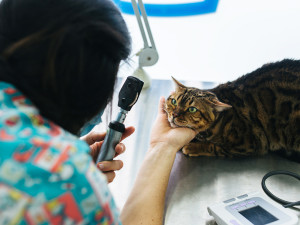A California Bill Could Significantly Help Unhoused People and Their Pets
Pet parents wouldn’t have to choose between temporary shelter and keeping their pets.

share article
Earlier this year, People Assisting the Homeless opens in a new tab(PATH) partnered with Los Angeles Homeless Service Authority opens in a new tab(LAHSA) and state assembly member Wendy Carrillo to introduce an important new bill that would allow unhoused people in the Los Angeles area to bring their pets with them to a shelter to stay. It’s rare for shelters to allow pets — PATH is an exception. AB 1215opens in a new tab would reestablish state funding that would allow more shelters to be able to accommodate pets in their shelters across the state of California. If passed, the bill would provide shelters state funds for pet food and veterinary services at both homeless and domestic violence sheltersopens in a new tab across the state.
In a statement, Carrillo emphasized the importance of this bill for the unhoused community: “As California looks for solutions for unhoused people across the state, we should not force individuals experiencing homelessness to choose between keeping their animal companion and obtaining urgent access to shelter.”
Per the Los Angeles Daily News ’s reportingopens in a new tab, LAHSA estimates that five to 10 percent of the about 70,000 unhoused people in Los Angeles County have a pet, which means this proposed legislation could help thousands who might be rejected by shelters because of their pets. Previously, the Pet Assistance and Support programopens in a new tab (PAS) provided the state with one-time funding for these resources, but AB 1215 would mean ongoing state funding.
Carrillo also notes in her statement that this funding would help to make seeking shelter a more comfortable experience for many: “AB 1215 is a local solution that works to assist our unhoused population in feeling comfortable when seeking temporary housing — a solution that directly addresses a hurdle to thousands when seeking temporary housing.”
The U.S. Department of Housing and Community Development estimated in a 2022 report opens in a new tabthat California has an unhoused population of about 180,000. With that in mind, this bill could dramatically change the quality of life for a significant portion of people living in the state. Advocates for the bill stress that more people will seek help if they know they won’t have to give up their pet in the process.
Another hurdle unhoused people face is access to (expensive) medical care and food for their pets. Thankfully, PATH has that covered. “Previous state funding through the Pet Assistance and Support program allowed PATH to provide care supplies and veterinary services for pets of our participants in our interim housing sites across the state,” Tyler Renner, director of media for PATH, tells The Wildest via email. He says that PATH has purchased collars, leashes, flea and tick meds, and other essentials.
Renner adds that with the resources they’ve gotten from previous funding, PATH has already been helping unhoused folks get the medical care they need for their pets: “We’ve also been able to cover veterinary services so everyone in the shelter, human and animal, stays healthy.”
It’s also something that could dramatically shift the increasingly dire nationwide overcrowding of animal shelters, especially if other states adopted similar actions. In 2020, it may have seemed like everyone was actually adopting a pet, but adoptions have actually declined. According to a reportopens in a new tab from the nonprofit, Shelter Animals Count, in the first nine months of 2022 more animals entered shelters than left them.
Plus, the number of cats and dogs facing possible euthanasia was 100,000 times higher in 2022 than in 2021. And in the case of environmental disasters, like the February Norfolk Southern train incidentopens in a new tab in East Palestine, Ohio, many residents aren’t able to take their pets with them when they need to evacuate. This leads to more abandoned pets, especially stray cats, following kitten season.opens in a new tab
With AB 1215, California, and states that could pass similarly modeled bills, could help the unhoused population and their beloved pets. Renner says he and his colleagues at PATH are hopeful that, with increased state funding, more pet parents and pets will receive the help they need: “One of the most vital goals of our work to end homelessness is to reduce barriers to services, shelter, and housing...At PATH, we try to reduce these barriers when possible and work to make our services and sites inclusive and accommodating to pets. Our hope is that more providers will see the value in supporting pets, that the state will continue to provide funding, and that people experiencing homelessness will embrace services.”

Kerensa Cadenas
Kerensa Cadenas is a writer based in New York. She’s previously worked at The Cut, Thrillist, Cosmopolitan, and Complex. Her work has been featured in Vulture, GQ, Vanity Fair, and others.
Related articles
![A dog at a shelter looking up at the camera.]() opens in a new tab
opens in a new tab10 Questions to Ask a Shelter About an Adoptable Dog
From exercise needs to medical history to compatibility with kids, here is everything you need to know.
![a person with short blonde hair and glasses hugs three rescue puppies and kisses one on the head]() opens in a new tab
opens in a new tabWhere Have All the Fosters Gone?
This is the Paula Cole parody that rescue orgs are singing as they struggle to find people to foster pets.
- opens in a new tab
Why Do I Have to Pay an Adoption Fee?
If you’re helping out a homeless pet, shouldn’t that be worth a freebie? The reality is, it costs a lot of money to care for shelter animals and to keep a shelter clean and safe.
![Black woman smiling and holding a Siamese cat which is looking into the camera]() opens in a new tab
opens in a new tabCARE Is Amplifying BIPOC Voices to Keep People and Pets Together
“We don’t consider what we are doing animal welfare work. We are taking a holistic approach to well-being for animals and humans.”
![Woman holding dogs at an animal shelter]() opens in a new tab
opens in a new tab10 Ways Animal Shelters Are Upping Their Game
New trends we can totally get behind.
![A woman smiling with a dog at an animal rescue service event.]() opens in a new tab
opens in a new tabAs Shelters Fill Up With Dogs, The Animal Pad Volunteers Roll Up Their Sleeves
The San Diego-based rescue’s 300 volunteers take saving Mexican street dogs as seriously as a full-time job (but have fun doing it).








